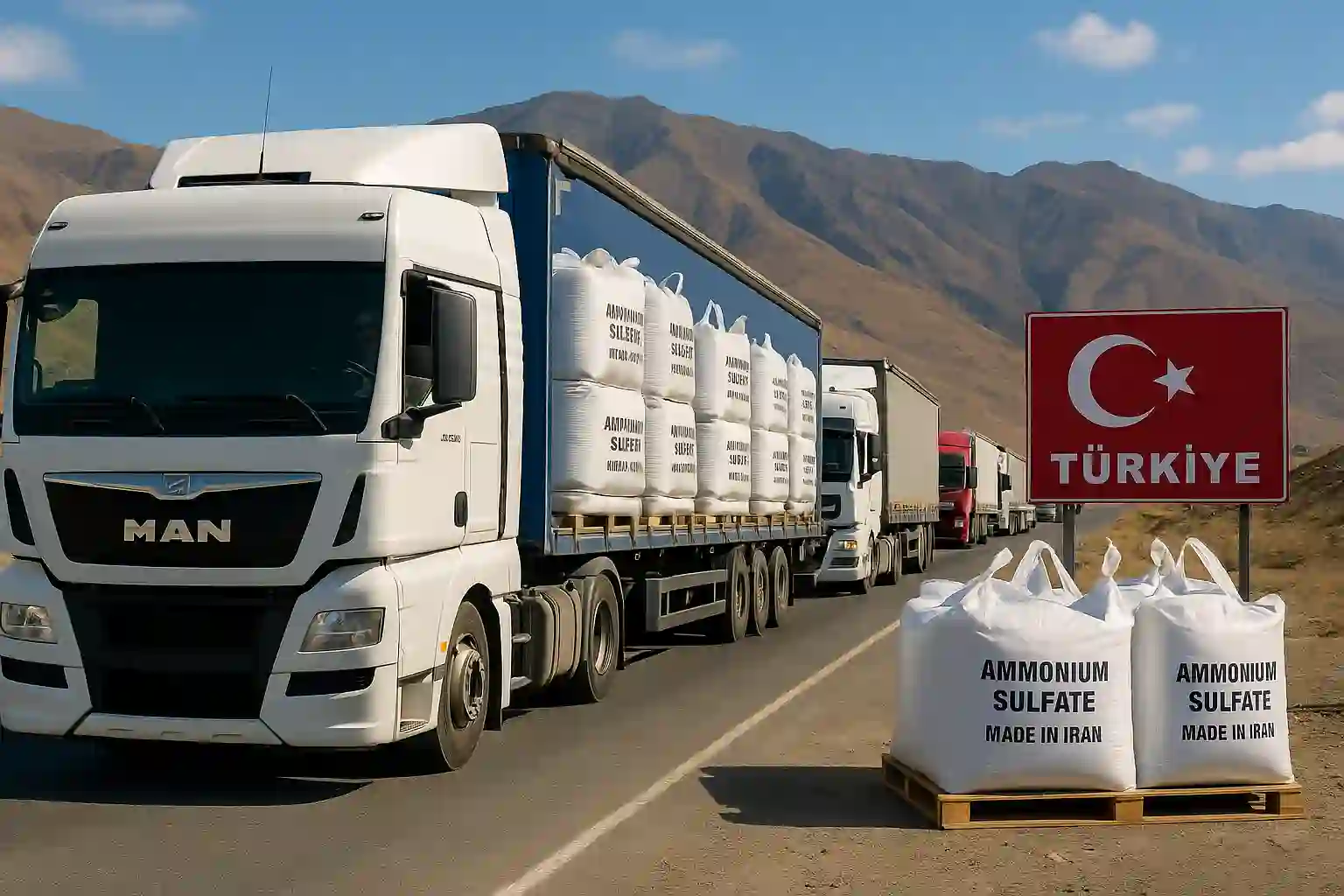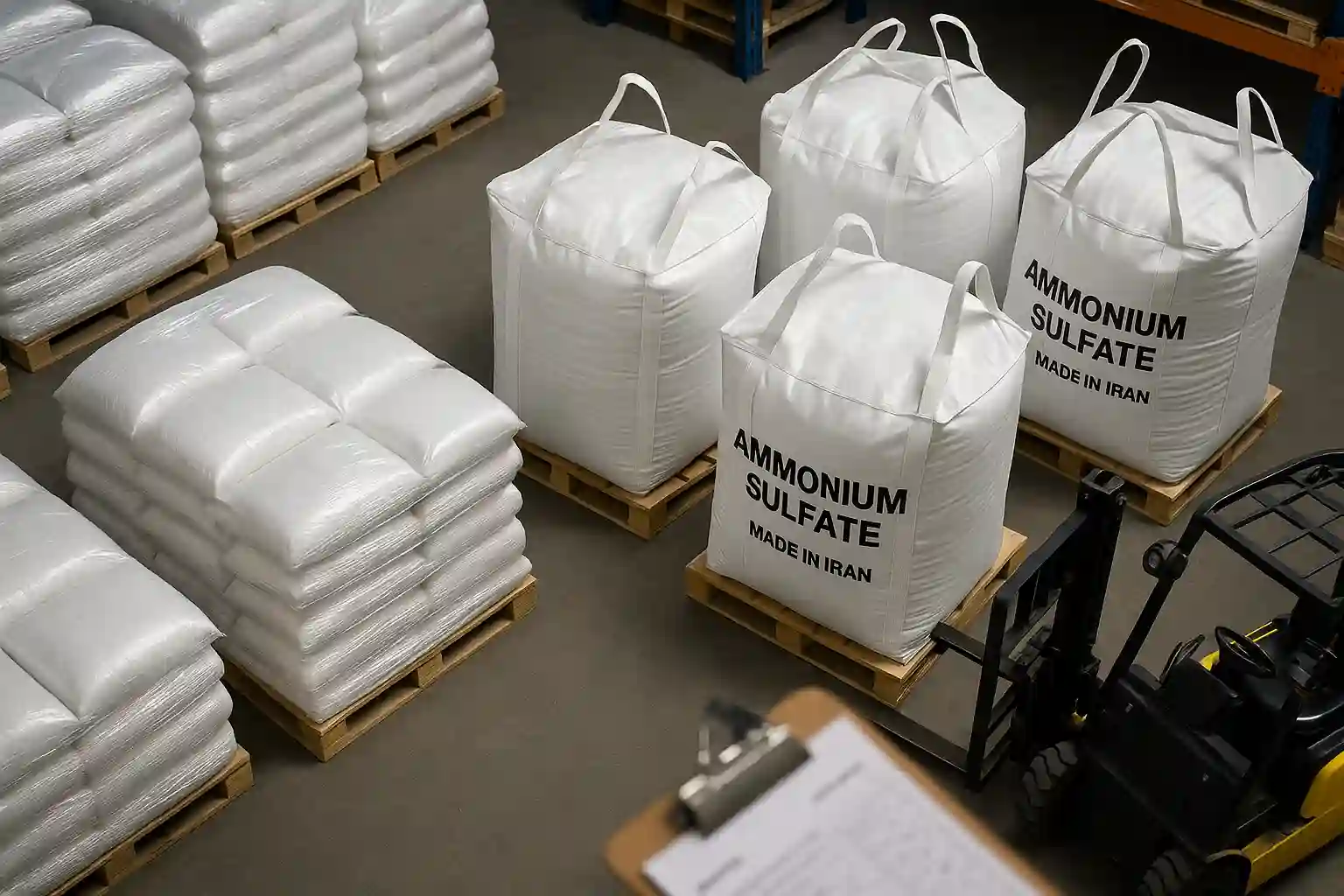Comprehensive Guide to Exporting Ammonium Sulfate to Turkey: A Reliable Step on the Path of Global Trade
Exporting ammonium sulfate to Turkey is like playing a professional game of chess—every move must be made with precision and strategy, or you might lose the game. Turkey, a neighbor with a dynamic economy and a market hungry for raw materials, is a golden destination for Iranian exporters. But success in exporting ammonium sulfate to Turkey is not just about having a good product. You need deep knowledge, careful planning, and a partner like Ammonium Sulfate Company, which not only provides high-quality products but also supports you throughout every stage—from production to delivery.
I have written this guide in complete detail to examine everything you need for exporting ammonium sulfate to Turkey—from market analysis, pricing, transportation methods, customs regulations, to even subtle business tips. The goal? To enter the thriving Turkish market with confidence and take your business to the next level. Ready? Let’s start this business journey!
Why Exporting Ammonium Sulfate to Turkey is a Unique Opportunity
Turkey, with its strategic geographic location, growing economy, and diverse industries, is one of the most attractive destinations for ammonium sulfate exports. Let’s dive deeper to see why this market is so valuable for Iranian exporters.
Growing Demand for Ammonium Sulfate in Key Turkish Industries
Turkey is an agricultural and industrial giant. Its agricultural sector ranked 7th worldwide in 2005 and remains a leader in producing crops such as cotton, wheat, olives, and fruits. Ammonium sulfate, as a high-quality nitrogen fertilizer, plays a vital role in increasing the productivity of the country’s farms. And this is just the tip of the iceberg.
Agriculture: Turkey produces millions of tons of crops annually. Due to its high solubility and rapid nitrogen absorption, ammonium sulfate is the preferred fertilizer for farmers in fertile regions like Antalya and Adana.
Chemical Industry: From plastics, resins, and detergents to complex chemical processes, ammonium sulfate is widely used in industrial cities such as Istanbul, Izmir, and Bursa.
Textile and Paper Industry: Turkey is one of the largest textile exporters in the world. Ammonium sulfate is essential in dyeing and paper production processes.
Mining and Metals: In metal processing and mineral extraction, it is used for cleaning and pH adjustment, especially in eastern Turkish mines.
The geographic proximity of Iran and Turkey is a major competitive advantage. Transportation costs are lower than European or East Asian competitors, allowing you to offer more competitive prices. But this is just the hardware—the software of this business is your product quality and services.
Competitive Advantage of the Ammonium Sulfate Brand
At Ammonium Sulfate Company, we produce a high-purity product (over 98%) that meets international standards. This quality not only fulfills the needs of Turkish industries but also earns customer trust. Professional packaging, timely delivery, and logistical support put you a step ahead in the competitive Turkish market.
Personal Experience: A few years ago, I spoke with a trader in Ankara who complained about the low quality of ammonium sulfate from another supplier. He said, “A good product keeps customers, but excellent service makes them love your brand.” This is our philosophy at Ammonium Sulfate Company.
Question for You: What do you think motivates Turkish customers to buy from you? Quality? Price? Or maybe after-sales service?
In-Depth Market Analysis of Ammonium Sulfate in Turkey
To succeed in exporting ammonium sulfate to Turkey, you must investigate the market like a detective—every clue can lead you to treasure. Turkey, with its diverse economy and dynamic industries, offers tremendous opportunities but also some challenges that must be understood.
Target Customers in Turkey
Identifying your target customers is the first step in exporting ammonium sulfate:
Farmers: Looking for high-quality and affordable fertilizers for cotton, wheat, and fruit farms. Agricultural areas like Çukurova and Antalya are your primary customers.
Chemical Plants: These customers prioritize high purity and quality, seeking products that do not disrupt their sensitive processes.
Textile and Paper Industries: Value professional packaging and fast delivery. Cities like Bursa and Gaziantep, textile hubs, will be your loyal clients.
Factors Affecting Ammonium Sulfate Demand in Turkey
Seasonal Demand: During planting seasons (spring and autumn), demand peaks. For example, spring is the time for cotton and wheat planting, requiring nitrogen fertilizers. Planning exports during these times can multiply profits.
Competition: China, Russia, and some European countries are major competitors. High quality and competitive prices give you an edge (Solotis analysis).
Currency Fluctuations: A decline in the Turkish lira affects purchasing power, but the steady demand for ammonium sulfate mitigates this risk. Long-term contracts can help manage it.
Market Trends
According to MacMap reports, demand for chemicals like ammonium sulfate is rising in Turkey due to the growth of agricultural and chemical industries. Additionally, trade agreements between Iran and Turkey have reduced some customs tariffs, creating further opportunities.
Suggested Image: A cotton farm in Antalya with workers using ammonium sulfate fertilizer and tractors in the background.
Strategic Pricing for Exporting Ammonium Sulfate to Turkey
Pricing in ammonium sulfate exports to Turkey is like walking a tightrope—you must balance retaining customers without sacrificing your profit.
Key Factors in Pricing
Global Market Fluctuations: Prices depend on global supply and demand. For example, higher demand in Asian agriculture may drive prices up. MacMap is a great source to monitor global prices.
Transportation Costs: Costs vary by mode (road, rail, sea). Road transport from Bazargan border is generally cheaper than sea transport to Turkish ports like Mersin.
Customs Tariffs: Thanks to Iran-Turkey trade agreements, tariffs are reduced but still must be included in calculations.
Product Quality: High-purity ammonium sulfate (like ours) adds value due to better efficiency in agriculture and industry.
Order Volume: Larger orders often get better pricing due to reduced per-ton costs.
Pricing Strategies for Success
Understand what your target customers expect and are willing to pay. At Ammonium Sulfate Company, we maintain transparent pricing and help optimize your costs.
Pro Tip: Always maintain a reasonable profit margin. Too low a price may harm perceived quality and customer trust. Fixed-price long-term contracts can reduce currency fluctuation risks.
Personal Experience: A client in Bursa shifted his contract from a Chinese supplier to us because our competitive pricing paired with high quality struck the perfect balance.
Transportation Methods for Exporting Ammonium Sulfate to Turkey
Transportation is the heartbeat of ammonium sulfate export. Choosing the right method and route can reduce costs, shorten delivery times, and ensure customer satisfaction. A small mistake, like choosing the wrong route, can waste time and money.
Key Borders for Export to Turkey
Iran and Turkey share three main borders:
Bazargan/Gurbulak: The busiest land crossing, ideal for medium to large shipments via trucks, providing speed, flexibility, and access to major cities like Ankara, Istanbul, and Izmir.
Razi/Kapikoy: Suitable for rail and truck. For bulk shipments, rail can significantly reduce costs. Ideal for eastern Turkey like Van and Erzurum.
Sero/Esendere: Best for eastern and southeastern Turkey. Trucks perform well for light to medium loads. Good for cities like Diyarbakir or Mardin.
Table Comparison of Transportation Methods for Exporting Ammonium Sulfate to Turkey
| Border | Main Transport Method | Key Advantages | Disadvantages | Suitable Cargo Type |
|---|---|---|---|---|
| Bazargan/Gurbulak | Truck | High speed, access to central cities, flexible | Higher cost for very heavy loads | Regular & time-sensitive |
| Razi/Kapikoy | Rail & Truck | Economical for heavy loads, more stable | Slower, limited to rail routes | Bulk & heavy cargo |
| Sero/Esendere | Truck | Access to eastern Turkey, good for light loads | Less developed infrastructure than Bazargan | Light & medium cargo |
Pro Tip: Road transport from Bazargan is usually the best choice unless shipping very heavy loads, where rail from Razi is more economical.
Transportation Options
Truck: Flexible and fast. Direct delivery from warehouse to destination. Suitable for 10–50 tons.
Rail: Economical for heavy loads (50+ tons). Ideal for bulk exports.
Sea: For very large shipments, from southern Iranian ports (e.g., Bandar Imam Khomeini) to Turkish ports (e.g., Mersin). Slower but suitable for bulk cargo.
Personal Experience: A client in Istanbul faced a two-week delay due to choosing sea transport instead of road. Since then, we recommend Bazargan road transport for Turkish exports unless volumes are extremely large.
Customs Regulations for Exporting Ammonium Sulfate to Turkey
Ignoring customs rules can turn exporting into a nightmare. Incomplete documents or non-compliance may delay shipments and cost clients.
Required Documents
Commercial Invoice: Product details, quantity, price, and sale terms (FOB/CFR). Must be accurate and transparent.
Packing List: Net/gross weight, package count, type (25kg bags or jumbo bags).
Certificate of Analysis: Confirms high purity (>98%).
MSDS (Material Safety Data Sheet): Safety, hazards, and handling instructions.
Bill of Lading: Ownership document issued by the carrier.
Certificate of Origin: Shows product is made in Iran, in English per Turkish customs rules.
Customs Process
Declaration in Iran: Submit documents to Iranian customs. If correct, shipment is approved.
Transport to Border: Coordinate with carriers to Bazargan, Razi, or Sero.
Clearance in Turkey: Customs checks documents, pays duties, and approves entry if standards are met.
Personal Experience: Incomplete MSDS caused a 3-day delay at Bazargan. Now, we use a complete document checklist.
Turkey Customs Regulations
Packaging Standards: Strong, moisture-resistant, with Turkish or English labels.
Tariffs: Usually reasonable; check MacMap for details.
Special Certificates: Sometimes CE certification is required.
Pro Tip: Hiring a Turkish customs broker can speed up clearance and avoid delays (Karmento recommendation).
Professional Packaging for Export
Packaging can determine success or failure. Turkish customers value professional, safe, and attractive packaging.
Standards
25kg Bags: Medium loads, clear labels in Turkish/English, moisture-resistant.
1-ton Jumbo Bags: For bulk cargo, economical and safe. Suitable for rail/sea.
Palletizing: Wooden/plastic pallets for safe, easy handling.
Labeling Importance
Labels should include:
Product name (Ammonium Sulfate)
Purity (>98%)
Net and gross weight
Safety & handling instructions
Manufacturer contact info
Personal Experience: A Gaziantep client preferred our neatly labeled product over competitors, showing how small details matter.
Opportunities and Challenges in the Turkish Market
Opportunities:
Seasonal demand peaks in spring & autumn
Geographical proximity reduces transport costs
Iran-Turkey trade agreements reduce tariffs
Expanding agricultural and chemical industries
Challenges:
Strong competition (China, Russia, Europe)
Currency fluctuations affect purchasing power
Strict customs regulations require full compliance
Question: Which strategies would help you stand out—quality, price, or after-sales service?
Purchasing and Cooperation Process
Easy Purchase Process
Price Inquiry: Contact us with volume, destination, and delivery time. Response in <24h.
Proforma Invoice: Detailed pricing, delivery, and customs costs.
Production & Packaging: 25kg bags or 1-ton jumbo bags, standard labels, moisture-resistant.
Transport & Delivery: From warehouse to destination, managed by us.
Pricing Determinants:
Order volume (large orders = better per-ton pricing)
Delivery terms (FOB, CFR)
Market fluctuations (we monitor global prices daily)
Personal Experience: Transparency and fast response in Izmir earned us long-term partnerships.
Golden Tips for Success
Don’t compromise quality for price (>98% purity).
Build strong communication (Turkish or translator).
Timely delivery earns trust.
Network in Turkish trade fairs (e.g., Antalya Agriculture Fair).
Personal Experience: A Gaziantep client valued timely delivery and support even more than product quality, making repeat purchases.
Conclusion: Conquering the Turkish Market
Exporting ammonium sulfate to Turkey opens a world of opportunities. Knowing the market, choosing the right transport, complying with customs, and delivering quality products will make you shine. At Ammonium Sulfate Company, we stand by you from production to delivery.
Now it’s your turn: Are you ready to turn this opportunity into success? Contact our experts and take the first step in exporting ammonium sulfate to Turkey. Share in the comments your challenges or questions—let’s start the conversation!



